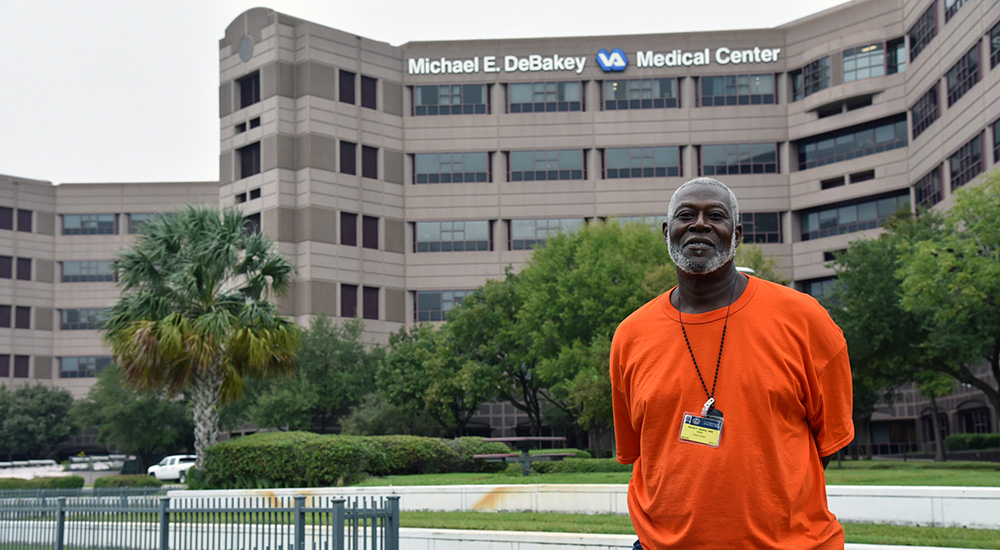Army Veteran Lonnie Conerly had to overcome bipolar disorder, a crack cocaine addiction, years of homelessness and prison time to get back on his feet.
His journey is an inspiration to others.
At one point, Conerly (pictured above) held a top-secret clearance and was testing nukes while serving in Germany. He loved the Army and planned to make it a career, but some personal issues derailed those plans. His army career soon would be over.
Nuclear bomb tester didn’t really “pop” on a Houston job application. He worked two jobs, making just enough to pay the bills, buy groceries and have $45 left over. With a failing marriage and being angry and depressed, he tried crack. It was 1983.
“I felt like I was on top,” he said of his first hit of the pipe. “Like I could do anything.” He was on it off-and-on for 12 years, and was arrested twice. No longer working, he somehow maintained his habit.
He lived in a large, hulled-out A/C unit that was broken, used cardboard as a blanket and ate when he could. He lost 60 pounds and became suicidal.
On the path to recovery
“I’ve tried to take my life four times,” he said. “I slashed my wrists, took a bunch of pills, turned all the gas jets on, waited until the house filled up with gas and lit a cigarette. I took 20 sleeping pills, woke up, and was pissed off because I woke up. My life sucked. I hated myself.”
He knew he was a better person than he was portraying but didn’t turn things around until he got around positive people. Rock bottom was the year he spent in prison.
Houston VA Mental Health services got him on the true path to recovery. Conerly spent nine months in the psychiatric unit for substance abuse and to treat his bipolar disorder. He’d gone his entire life undiagnosed and feeling angry all the time.
Dr. Aaron Short, a Houston VA psychiatrist, has nothing but admiration for Conerly and the way he has embraced treatment for his mental health needs. In addition to meetings with his psychologist, Conerly regularly attends peer support groups. Sharing experiences with other Veterans gives him an emotional outlet.
I have the utmost respect for him
“He was willing to discuss things openly,” said Short. “He was honest with himself and used his experience to provide assistance to others.”
Short said Conerly “has a mature way of coping with life’s unpleasant moments. I have the utmost respect for him.”
For Conerly, cutting out negativity and focusing on the positive has been a big part of his attitude change.
“I’ve had a lot of damn negative people in my life. I stay to myself,” Conerly said. He continued, “I don’t have many friends for that very reason. I don’t need the negativity.”
Conerly has learned so much about himself through therapy that he no longer allows the behavior of others to determine his mood.
“I try to stay out of my own way,” he added. “Because I have a tendency to mess it up real quick, I can’t allow people to push my buttons. I have to walk away because I am the one who must pay the consequences of my actions.”
Conerly has been sober 15 years. He has a good relationship with his son and daughter and has a 3-year-old grandbaby. For that, he is grateful. His back injury from a car accident won’t allow him to work like he used to, so he works at Houston VA in the vocational rehabilitation program.
He wanted to share his story so that other Veterans in crisis can see it’s never too late. His advice is simple and straight forward: “Get help.”
Strap your boots on and keep moving
“Make sure you’re ready for the ride, cause it’s a ride. There are going to be a bunch of lows and letdowns. Life is just going to show up. And when it shows up, you have to strap your boots on and keep it moving. If you don’t, you’re subject to fall back to where you were. I can blow up my life in a matter of seconds, but trying to rebuild it – that’s the hardest part. You’ve got to want your life to change.”
“Keep moving forward” is Conerly’s mantra.
“One day at a time. Just got to keep pushing. The cost of starting over is too high, so I take my meds like I’m supposed to take them.
“I make my meetings like I’m supposed to make them. I focus on the future as best I can. Reach out and help someone when I can. Keep my side of the street clean and everything will be alright.”
Todd Goodman is a public affairs specialist with the Houston VA.
Topics in this story
More Stories
Bob Jesse Award celebrates the achievements of a VA employee and a team or department that exemplifies innovative practices within VA.
The Medical Foster Home program offers Veterans an alternative to nursing homes.
Watch the Under Secretary for Health and a panel of experts discuss VA Health Connect tele-emergency care.








The homeless program has saved my life. But like everything else it is a work in progress. I’m a homeless veteran in the program here at Carl Vinson VAMC and I’m very grateful for these folks